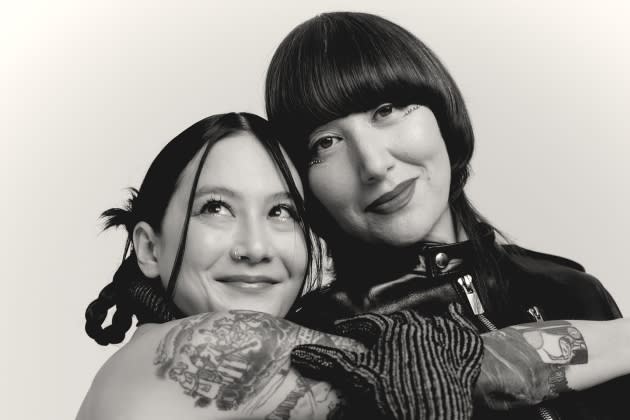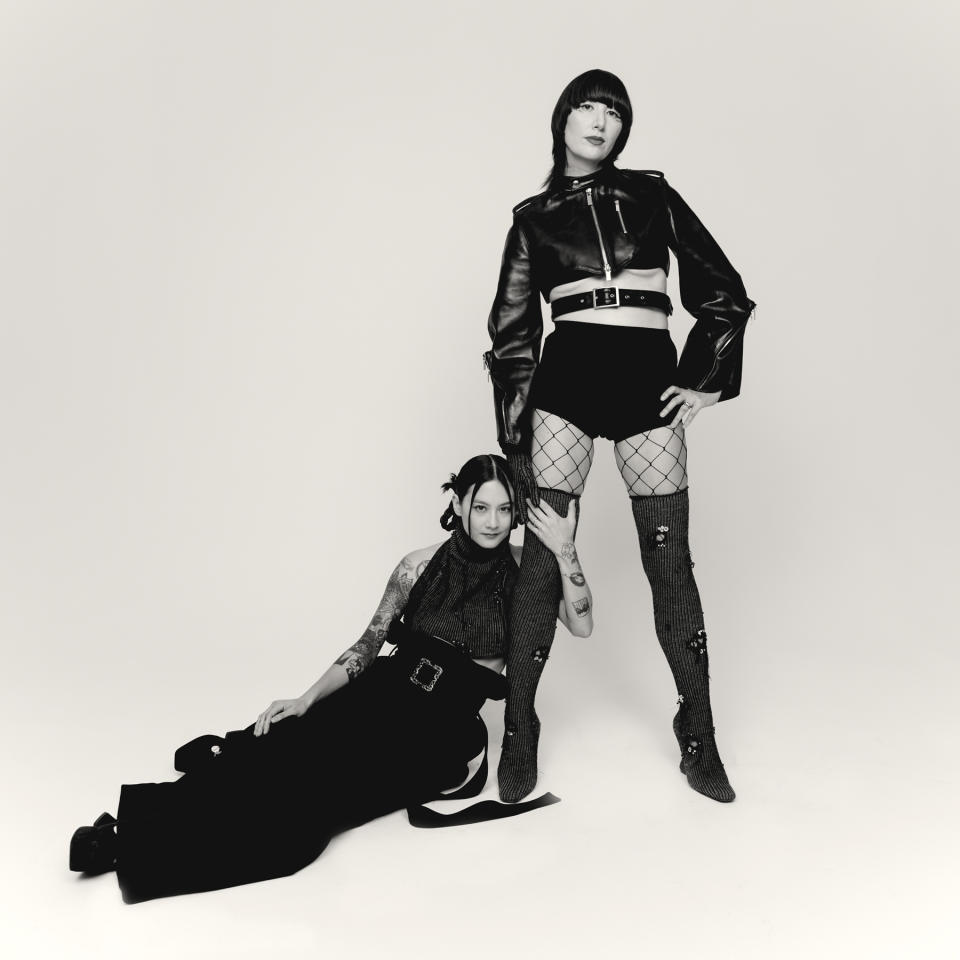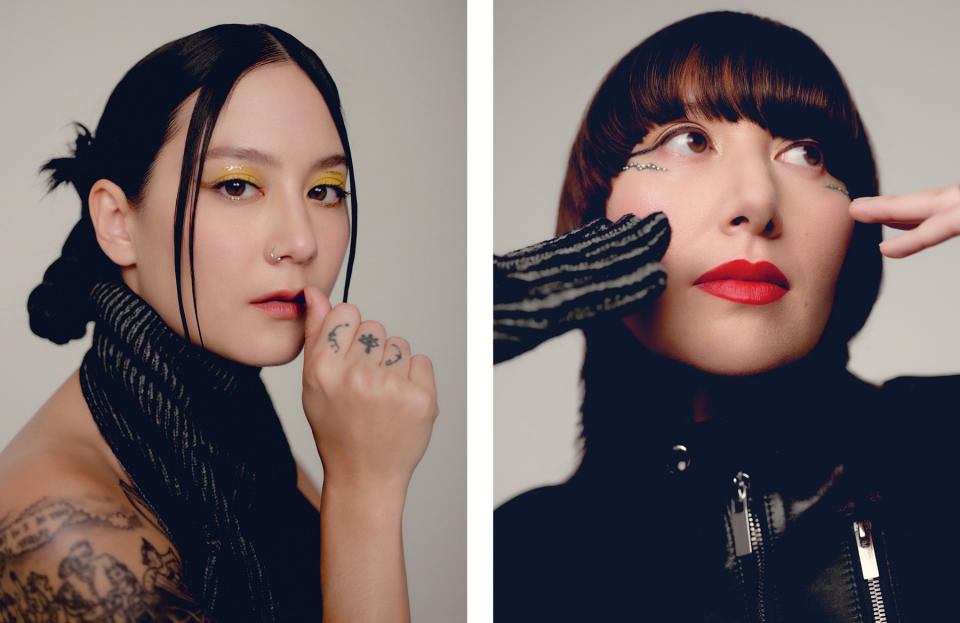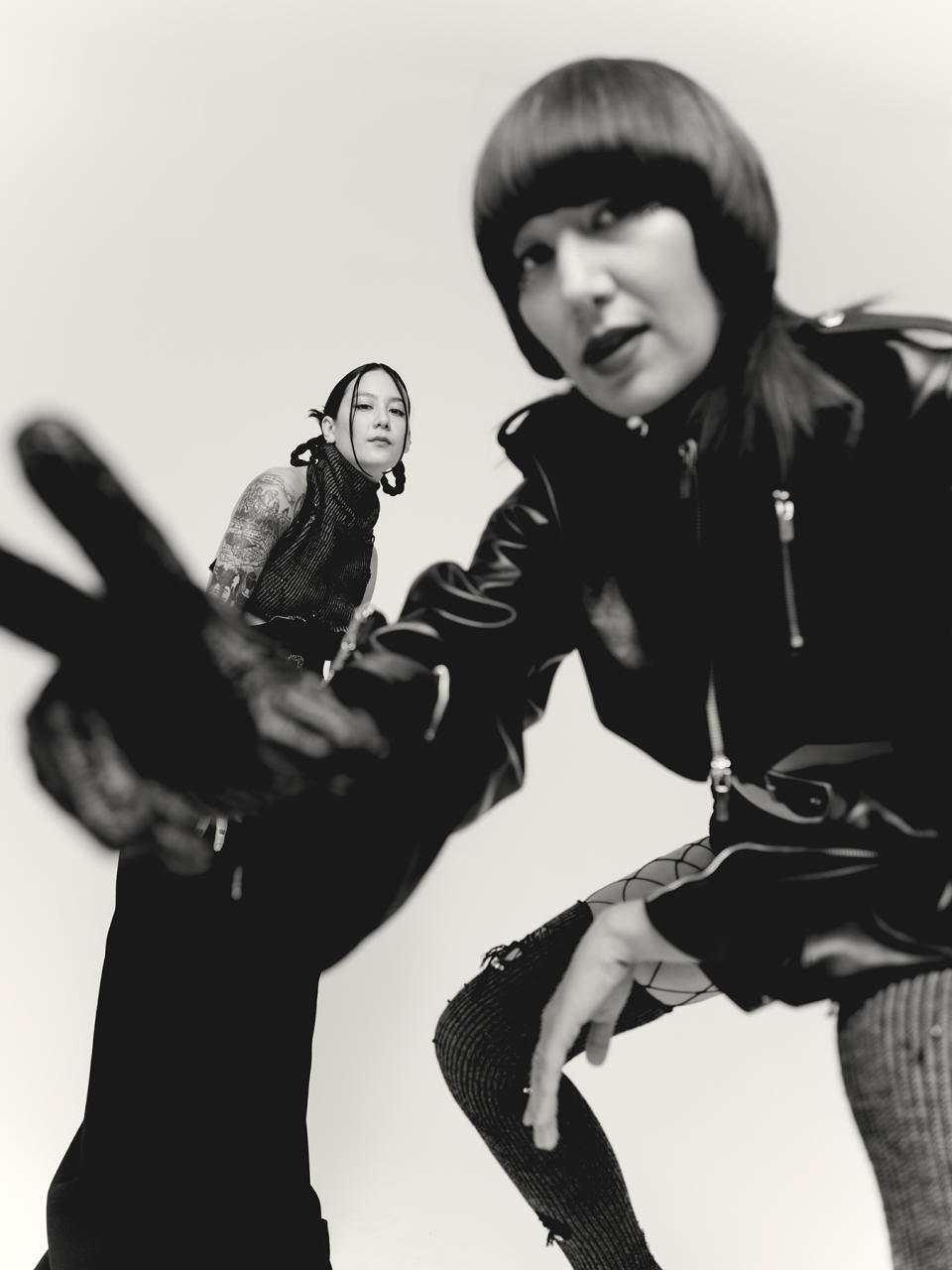Karen O and Michelle Zauner on Smashing Expectations and the Power of ‘No’
- Oops!Something went wrong.Please try again later.
- Oops!Something went wrong.Please try again later.

About a year ago, Karen O was scrolling through Instagram when she came across a photo of Japanese Breakfast frontwoman Michelle Zauner that left her a little concerned. It was from a stop on Zauner’s relentless tour over the past couple of years, which has included more than 100 concerts and promotional appearances on the heels of her Grammy-nominated third album, Jubilee, and her bestselling memoir, Crying in H Mart. “She had the million-mile stare,” says Karen O, who turns 44 in November.
Listen to the ‘Musicians on Musicians’ podcast featuring Karen O. and Michelle Zauner
More from Rolling Stone
Related
Latto and Flo Milli See Stars in One Another

Watch Live: Behind-the-Scenes from Austin City Limits Music Festival
From Kacey Musgraves to Paramore, Here's How to Watch the Austin City Limits Music Fest Livestream Online for Free
It’s late August in Los Angeles, and Karen O and Zauner are sitting in a studio in the Arts District, meeting in person for the first time and looking back on their text exchanges from around the period of that million-mile stare. “She sent me some really nice messages,” says Zauner, 33. “It felt very K.O. She was like, ‘If you ever want to break a table with me …’”
Karen O erupts with laughter. As the frontwoman of the Yeah Yeah Yeahs, the indie-rock band she formed in 2000, she can relate. “[The road] can wear you down,” she says. “The best thing to do in that situation is smash some glass. For me, it was a poster of us. I put my foot through it. It takes the edge off.”
Zauner grew up idolizing Karen O, a fellow Korean American who became famous for her magnetic stage presence — spitting beer into the crowd was not an infrequent occurrence — and New York swagger. The Yeah Yeah Yeahs recently released Cool It Down, their first album in nine years. Karen O is more than happy to pass down some advice: “Michelle, if you ever wanted to bitch to me about the pains of anything, I’m your woman.”
KAREN O: I feel very familiar with you, in some funny way. Do you feel that way with me at all?
ZAUNER: I also have that feeling. I mean, I guess we’ve lived somewhat similar lives.
KAREN O: There’s a lot of parallels. But the parallels don’t really explain … It’s just chemistry, a natural connection that you feel with somebody.
ZAUNER: I think we also both talk fast, and jolty, with a lot of filler. And that makes me more comfortable. “Someone else does that too!”
KAREN O: Totally. And I could tell you’re a very authentic person, and I’m the same way, to a fault —where I wish I could be Snappy McSnap-Snaps, just charm the pants off of everybody. But, yeah, I just got to be me, and I can sense that off of you as well.
How did you discover each other’s music? Michelle, you wrote beautifully in “Crying in H Mart” about discovering a Yeah Yeah Yeahs DVD as a teenager.
KAREN O: That’s a crazy DVD, too. It’s, like, a deep-cut DVD.
ZAUNER: Yeah. I was hooking up with this guy. The only cool thing he had to offer was—
KAREN O: That DVD?
ZAUNER: That DVD. And he was a really big fan. I had seen the album cover of Fever to Tell and it just looked so cool and punk. I had seen the Yeah Yeah Yeahs as music listed under people’s LiveJournal music posts. It was always someone that was way cooler than me. So I had heard the name, and then I saw the DVD. It starts with “Y Control” and builds, and then you just come bounding off of the side. I’d just never seen that type of showmanship, in particular. Not just [from] a woman — and not just a half-Asian woman, which I didn’t even know you were at the time — but I’d never seen someone that was able to have so much control over their movements, but also feel so raw and chaotic. There’s bravado, but there’s also a lot of joy. It’s a very uniquely singular part of your performance that is so captivating and exciting. And then, to discover later that you were born in Busan —
KAREN O: Actually, I was born in Seoul.
ZAUNER: You were born in Seoul, that’s right! Your Wikipedia used to say [Busan].
KAREN O: Does it still say that?
ZAUNER: Yeah, it still says that.
KAREN O: We changed it two years ago. I guess they went back—
ZAUNER: Busan really wants to claim you [laughs]. It seemed like this crazy cosmic thing, that someone could have had a similar background, at the time when I didn’t even know another human being that had that same experience as me.

KAREN O: I heard a lot of echoes about the excerpt of your book, when it came out in The New Yorker. I felt like it was a pretty wild experience reading your memoir, because I’ve just never read a memoir that I related to so completely. I’ve never read a half-Asian — halfie, that’s what we’ve always called it — but half-Korean, half-American woman’s memoir, who started a band. There’s just so many parallels. It was a really awesome experience. Even the ties of you going to Korea with your mom, I had the same thing. It was pretty profound to be able to read such a raw and incredibly soul-bearing memoir, but also, it [was] from someone like me. It made a huge impression on me, and it’s brilliant.
Everybody should have a memoir as a companion piece with their records. Especially these days, because of the way we consume everything. Things just wash over you like droplets on the surface, and it’s a shame. Making a record, you’re putting every ounce of blood, sweat, and tears, and really going to wherever music takes you, which is almost like a spiritual thing. And then the way people consume, it’s lucky if you get past skin deep. Having the memoir to go along, I’m so glad that you do have that.
ZAUNER: I would read the shit out of a Karen O memoir. There’s the film [2022’s Meet Me in the Bathroom, an upcoming documentary on Lizzy Goodman’s oral history of the early-2000s New York rock scene], but I haven’t seen it yet. Have you seen it?
KAREN O: Yeah. I had to give some notes, to steer it in the direction that I felt was more—
ZAUNER: You.
KAREN O: Yeah, representative of what I was going through. Because it was me in a sea of dudes for most of my career.
ZAUNER: Did you feel that way at the time? Or was it just so normal that you didn’t even think of an alternative?
KAREN O: Of being the only girl? I mean, there’s definitely perks to being the only girl. For instance—
ZAUNER: The bathroom line.
KAREN O: [Laughs.] Yeah. There’s no bathroom line, ever. And, yeah, I think it’s exhilarating. I just felt very mischievous and defiant, and I loved breaking all the rules that the boys had to follow. I was competitive, so in my mind, it just felt like it was just always me versus a bunch of, as I call [them], “boy bands.” But, yeah, it was really lonely. There were so many times where I felt like I could have really used a mentor. Someone that I could’ve asked, “Hey, what do you do when you feel this way?” Another woman who has already been through it. But there were just so few, and there wasn’t the connectivity that there is now. I couldn’t DM someone.
ZAUNER: I think, when I came up, it was probably slightly less of a boys’ club, but it still felt that way at the time. It wasn’t until Japanese Breakfast happened that that landscape began to change.
KAREN O: It’s hard for me to relate to being able to have other women in what you’re doing, to have any sort of camaraderie, because I was really isolated in what I was doing. But it fills me with joy that you have that now, and that bands like Linda Lindas are coming up and making such a splash, too. Not feeling like outsiders. Like, “Yeah, I belong here.”
ZAUNER: We got to grow up, seeing you in that space, and that definitely paved the way for so many people.
KAREN O: That makes it all worth it.
ZAUNER: I genuinely don’t think that I’d be playing music if I didn’t see that, and just be like, “Well, she can do it. She’s doing everything my mom would be horrified to see me doing, and that’s exactly what I want to be doing.”
KAREN O: Oh, my God [laughs].
ZAUNER: I’m actually kind of nervous about opening for you [at one date this fall], because I’m like, “What rock moves did I accidentally steal from Karen?”
KAREN O: Oh, don’t worry about that. I was reading [something] about how we’re all mosaics of the people that we love, or the people that have influenced us over the years. You’re this mosaic of everything that’s ever moved you, or inspired you, or that you’ve loved. And I really think that’s the case. I’ve stolen so many moves from people that I’ve known, and you just make them your own. I can’t wait to see what you come up with.
ZAUNER: I have a total non sequitur question, because I think it’s interesting. It was very sweet that you hit me up after we got nominated for a Grammy.
KAREN O: Oh, yeah. Graminated.
ZAUNER: [Laughs.] Yeah, when we got Graminated, I was like, “Wow, Karen sent me some words of encouragement to go into the Grammys, and to be prepared that it was going to be sort of weird.” Ben Gibbard, who’s another hero of mine, told me that it was really wild, because the year that Death Cab [For Cutie] was nominated for their Grammy [in 2007], they lost to “My Humps.” Do you have any Grammy memories like that?
KAREN O: We only went once [in 2004]. We were brimming with excitement. My best friend made my outfit on her sewing machine. It was super DIY, which was kind of amazing. Our seats were nosebleed seats, by the way. I just remember there being a Cirque du Soleil swing, and I think Usher was swinging on it. [Editor’s note: He wasn’t, but we wish he were.] We lasted about 10 minutes, and then we all vacated to the stairwell. I have this picture of us smoking in this stairwell. Like, “Oh, shit, that’s rough. That’s just so not our vibe.”
ZAUNER: Do you remember who you lost to?
KAREN O: No clue.
ZAUNER: That doesn’t stick with you for years?
KAREN O: No. I have no idea.

ZAUNER: What were the Oscars like? [Karen O co-wrote “The Moon Song” with Spike Jonze for Her; it was nominated for Best Original Song in 2014.]
KAREN O: That was a whole other experience. We were part of the show, because we were performing. It felt very VIP, in a funny way. My mouth went completely bone dry — literally not a molecule of moisture — right before I went on. I was like, “Fuck.” After we did the song, Leo DiCaprio stood up, and he was clapping. He was so pumped for our performance.
ZAUNER: If you want to impress one person, it’s him. How are you feeling, going into this new cycle? How long has it been?
KAREN O: It’s been nine years. Since our last record, I now have a seven-year-old kid, and it’s been the pandemic for almost three years. Doing those shows this summer was very much needed, just to connect with an audience again. We really can feel what it feels like to return to an audience who have been your fans for almost 20 years. They need it, and we need it. It’s a lot of joy.
I feel excited about the shows that we’re going to do with you and the Linda Lindas. A big “We’re back. Check how much the world has changed since last time we’ve been here; we have these incredible Asian American women supporting us.” That wasn’t a thing at all for me, for the majority of my career.
Karen, you’ve said you were rarely asked about that in interviews.
KAREN O: The question I always got was, “How does it feel to be a woman?” Because that was the exotic thing at the moment. But the half-Asian thing, I do find it interesting. I’m curious to hear your point of view on it, because it’s just so much more on the radar. Being part Korean — and just Korean culture in general — was invisible growing up in the States. I’m still getting more in touch with that aspect of me, because it was invisible for so long. Even though it might get old to be asked about, you’re more deeply dialed into that than I am, being younger than me. It’s become extremely culturally relevant.
ZAUNER: I don’t think I really felt that way until the last five years, with the popularity of K-pop and BTS. And the internet has such a huge part of it now. You’re scrolling through TikTok and you can watch a Nigerian family eating their cuisine. You have this crazy insight into representation that we never saw before, because there’s no gatekeeping. I feel like it’s so much cooler to be mixed race, and so not cool to be a white person right now [laughs].
I never felt ashamed of being Korean, but I really didn’t like feeling like people were projecting some kind of stereotype on me in a way that I had no control over. I never wanted anyone to think of me as docile, or agreeable, or hyper-feminine. In some ways, my personality morphed into something that was in direct opposition to that. To a point where it’s like, I don’t even know if those parts were true to who I am, or if they were just my rebellion to what I felt like was being projected onto me.
Even with Crying in H Mart, it’s like, why does it have to be an Asian American story? This is a mother-daughter story. This is a coming-of-age story. It would be insane to call Catcher in the Rye a Caucasian coming-of-age. It feels unfair to see it through that lens, even though that lens is very important to me.
KAREN O: It seems like you really deeply relate and connect to your Asian roots, probably more than even me. It’s been extra cool to experience it through your prism.
ZAUNER: What was your first song? And how did you write it?
KAREN O: It was some doo wop-y type song that I played on the piano when I was nine of something. It was terrible, syrupy lyrics. “He don’t love me baby/No, no no.” I have this best friend, she’s my biggest fan. I played that song for her. She’s sitting next to me, and she’s like, “Karen. There’s Mozart, there’s Beethoven, and then there’s going to be Orzolek.” It was seriously a delusion of grandeur, but I needed that cheerleader at that time, and it made a huge difference. It’s funny how there’s those people in your life.
ZAUNER: When you wrote “Maps,” were you like, “Oh, I fucking did this?”
KAREN O: Oh, yeah.
ZAUNER: Was that the lead single?
KAREN O: No, that was our third single off of that record, so by the time it came out, the label had given up on us. Then “Maps” really struck a chord with the public, with the peeps. Most of what we had written for Yeah Yeah Yeahs up to that point was hard and rebellious and sexy, and this was a very vulnerable, super simple song. And also, very in our style, because Nick [Zinner] had this blue drum machine that felt signature to us. So we felt, “There’s something to this.” It feels like there’s kind of a shift in the ions in the room. Another presence has just entered. It’s mysterious and inexplicable.
ZAUNER: What was the writing process like for this record? I feel like when you get to the place in your life where you’re a mom and things are so settled … so much of songwriting can, at least initially, come from a place of personal chaos and drama. But how did you go about writing this record, and what were the kind of themes that you found, and how did you tap into that?
KAREN O: Yeah Yeah Yeahs were born in this time of turbulence and disquiet in the world. I was living downtown, in New York City, when September 11th happened. So there was a kind of end-of-the-world feeling at that time. We like to rise to the occasion, and can relate to when the world goes upside down.
ZAUNER: So right now it feels comfortable for you?
KAREN O: Yeah. Writing music in these somewhat apocalyptic times is something that we can relate to, in a funny way. When Nick and I got back together, we were so fucking stoked. We have baggage, man. We’ve been a band for 20 years. We were like giggling kids again. We felt fearless about tackling themes that were scaring the shit out of us, like the climate crisis, and impermanence.
I don’t think I would be playing music if I hadn’t seen [Karen] and been like, ‘She’s doing everything my mom would be horrified to see me doing, and that’s what I want to be doing.’
ZAUNER: What made you make the decision to take such a long hiatus?
KAREN O: In 2013, we were finally out of our record contract with Interscope and Universal. When that was over, it was weird. It felt like this psychic weight had lifted. I wouldn’t call it the hamster wheel, per se, but I just was free of this looming deadline. So I was like, “Wow, this feels totally different. Next time we make a Yeah Yeah Yeahs record, it’s going to be because I really, really, really, really want to make a record.”
ZAUNER: Not knowing it was going to be so long.
KAREN O: Yeah. I did know that I wanted to start a family. I remember having a conversation with Shirley Manson from Garbage at a dinner party, where she was just like, “Yeah, you want to have kids? You really need to make space for it. Because if you don’t, you’re probably going to miss your chance.”
ZAUNER: Was there a sadness, or a fear, when you went off? I feel like I’m at that place in my life. I’m 33 and I feel really ready for that, but I’m also so scared, because you’re so worried that once you get off the wheel, you’ll lose your true love.
KAREN O: Not in the least. I think someone told me: “Don’t worry about the empty plate. It fills up before you’re even ready to chow down again.” And it’s true. Don’t worry about taking a pause. Actually, I’m the master of “no.” I say no so much.
ZAUNER: You’re famous for it.
KAREN O: I’m famous for it? Oh, my God.

ZAUNER: I was talking to someone who works with you, and they were like, “Yeah, we come to Karen with a lot of stuff, and she usually says no, but it’s cool we get to say that we work with her.” I mean, you have a flawless track record. That’s pretty sick.
KAREN O: That’s the thing. Don’t be afraid of “no,” because that’s what makes them want you more, to a certain degree. Especially if what you’re doing is meaningful, and has a deeper truth, or has value to it. So I would say, absolutely, there should be no fear of it going away or vanishing.
ZAUNER: What was that conversation like with your bandmates? Was there some heartbreak?
KAREN O: Well, again, because I’m the master of “no” …
ZAUNER: They’re used to it.
KAREN O: Yeah. I set that precedent. But it was difficult, looking after yourself and your well-being. As a woman, especially in a boys’ world, it’s a sign of weakness to be like, “Oh, dude, I’m not feeling up for this. My rib hurts.” They’re like, “Oh, come on. Don’t be such a pussy.” What I had to learn was just that it’s fucking strong as fuck to make that clear boundary.
ZAUNER: That’s just so need-to-hear. I’m such a road dog, actually.
KAREN O: I feel like you’re the hardest-working woman in show business.
ZAUNER: I literally don’t even want to tell someone when I need to pee. I think I get off on just working myself to death. And now I realize, after six years of doing it, it is not sustainable. Part of it is probably the way that I was raised. Everything is my fault, and I have to fight to the death, all the time. I think both my parents were like that. This year, I’m really learning how to say no. And it is really scary.
KAREN O: I don’t think I’ve ever regretted saying no. I’ve regretted saying yes. I’m really happy, for the most part, with the niche I’ve carved out for myself.
ZAUNER: I think that you have the most admirable, long-standing, timeless career.
KAREN O: Thank you. I’m so freaking endlessly impressed by what you’ve put out into the world, and the doors you’ve opened for more of us. I think “no” would be a beautiful cherry on top of it.
ZAUNER: The “no” cherry.
KAREN O: Yeah. The “no” cherry.
Best of Rolling Stone

